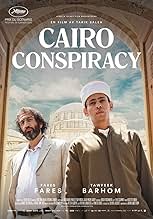Fresh from a viewing of "The Nile Hilton incident", watching "Boy from heaven" consolidates the prowess of Tarek Saleh as a filmmaker: a robust and sensational story coupled with a minimalistic yet ever developing sense of flashy cinematography. This review is probably going to end up being a comparison between Saleh's newest film and his previous, so let's get the latter out of the way: "The Nile-Hilton incident" is a thriller crime film deeply rooted in the depiction of an Egyptian society that is on the brink of an Arab spring revolution. The story follows Fares Fares' character, a deeply corrupt cop who is assigned an investigation into a shady hotel murder that turns his life upside down. There are undoubtedly two things that should be said about this film: firstly, the story is pretty good! It is used as an apparatus to unravel the complexities of an Egyptian society in spiral, laden by crime, poverty and police corruption. However, a second point must be raised: the film lacks the kind of artistic and technical passages that tickle the imposter snob in me. It is very plainly shot and that can be said about hundreds of great films, but fortunately not about "Boy from heaven".
I never thought a red turban could have ever been this beautiful. This movie really superseded my expectations in terms of the cinematography while maintaining a solid loyalty to its great story. The film follows a young and candid young man who is chosen to enrol in the Azhar institute: an Islamic studies school that is regarded as a beacon of Islamic sciences in the middle east if not the world. But it is soon understood that this highly coveted institute hides behind it may dark secrets and political conflicts that rival in ruthlessness those inside the Egyptian quasi dictator regime. And Tawfeek Barhom's character finds himself in the middle of this highly volatile and dangerous battle between religion and state.
In this film, Tarek Saleh worked the religious imagery and the beauty of the spiritual ritual in a way that reminded me of Paolo Sorrentino's "The Young Pope": they both depicted in high detail the serenity of the religious system as well as its terrifying rigour. And Saleh got a few great shots of some red hats! Tarek Saleh has caught the eye of the international cinema community for quite a while, but now has cemented himself as one of the best directors in Egyptian cinema.




















